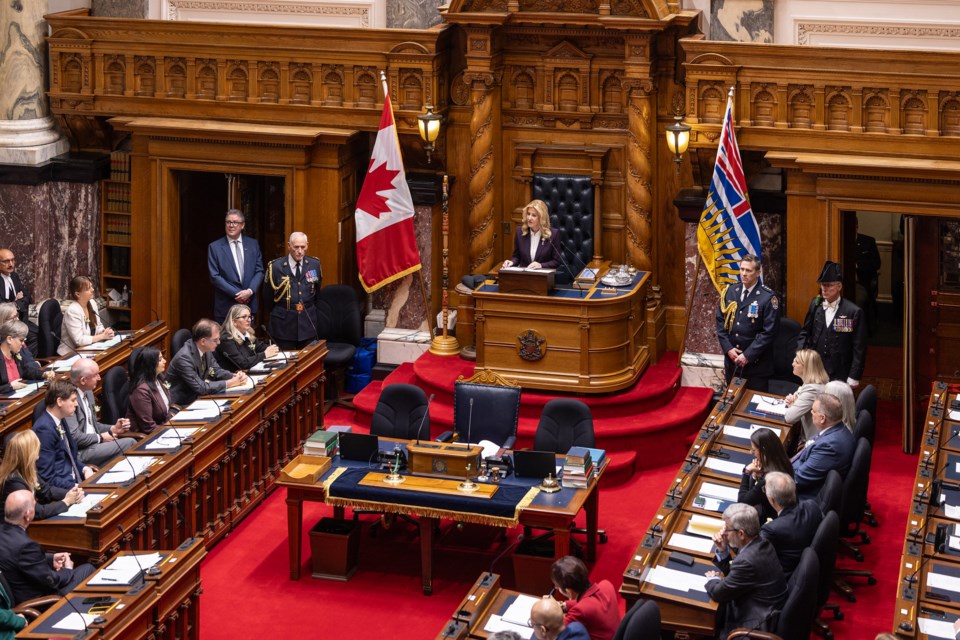Stop me if you’ve heard this one before: The B.C. government delivered a throne speech to open the legislature that was big on rhetoric, low on details and a sign, critics say, it’s out of ideas.
It’s a familiar broken record. Like an annual political Groundhog Day.
And it happened again Tuesday, as Premier David Eby’s government delivered his first throne since the October provincial election.
I’ll spare you the trouble of reading it: There’s nothing there. No new ideas. No new promises. No new programs or services to address the doctor shortage, ER closures, prolific offenders, street crimes, housing or cost-of-living concerns.
Instead, it was an 18-page creative writing exercise in political bombast, using the Second World War as some sort of tortured metaphor for the resilience British Columbians will need to fight off U.S. President Donald Trump’s tariffs.
If you were trying to figure out what the government was actually doing this spring, you came away actively dumber from the experience.
This is not what speeches from the throne are supposed to be.
In B.C., we’ve allowed ourselves over more than two decades to be lulled into a cycle of perpetual uselessness.
Every February, we gather up dignitaries from across the province, sit them in the legislature, fire off a few canons in Victoria’s inner harbour — and then speak high-level gibberish at them for more than an hour about growing a strong province that brings everyone together in a prosperous future for all. Vague platitudes. Aspirational niceties. The political equivalent of unflavoured oatmeal.
Once everyone leaves, the government starts dropping previously secret legislation onto the floor of the house, whenever it wants, however it wants.
Bills appear out of nowhere on subjects few people have heard about. Bills that make changes nobody in the public even knew the government was considering. Bills that are so complex they sometimes run hundreds of pages and were drafted by dozens of government lawyers.
Opposition MLAs have to scramble to read and research and debate, often within a matter of hours. Sometimes they run out of time, so the government of the day just cuts off discussion and passes everything into law, without any scrutiny.
If this sounds like a dumb way to run a legislature — you are right, it is.
Which is why the United Kingdom — where we have adopted our parliamentary traditions — doesn’t do it this way at all.
There, the government in the House of Commons tables a full public list of all the legislation it intends to introduce that year. It comes with a short description of what each bill will do, and key facts about why the government is making that move.
That’s accompanied by a brief introduction by the prime minister, and then a short speech by the monarch about the government’s goals.
In 2024, King Charles III took 10 minutes for his speech. The list of bills was around 100 pages. You can read it all here.
In B.C., the lieutenant governor’s speech Tuesday took three times as long, to accomplish, comparatively, nothing.
I put the question to Eby — have you ever thought of reforming our annual throne speech into something more useful? Perhaps modeled back on the U.K. approach?
“It’s an interesting suggestion,” he replied. “We’ll have a look at it.”
Then he pivoted to talk more about the American tariff threat, which was the theme of his speech.
So, don’t hold your breath.
Which is a shame, because it’s clear we could change things here for the better.
Let the premier of the day do an annual address to the people, televised live and on social media, filled to the brim with whatever political narrative they want to spin.
But leave the legislature throne speech to its original purpose: Outlining the important legislation that will become laws for the entire province.
Rob Shaw has spent more than 17 years covering B.C. politics, now reporting for CHEK News and writing for Glacier Media. He is the co-author of the national bestselling book A Matter of Confidence, host of the weekly podcast Political Capital, and a regular guest on CBC Radio.




